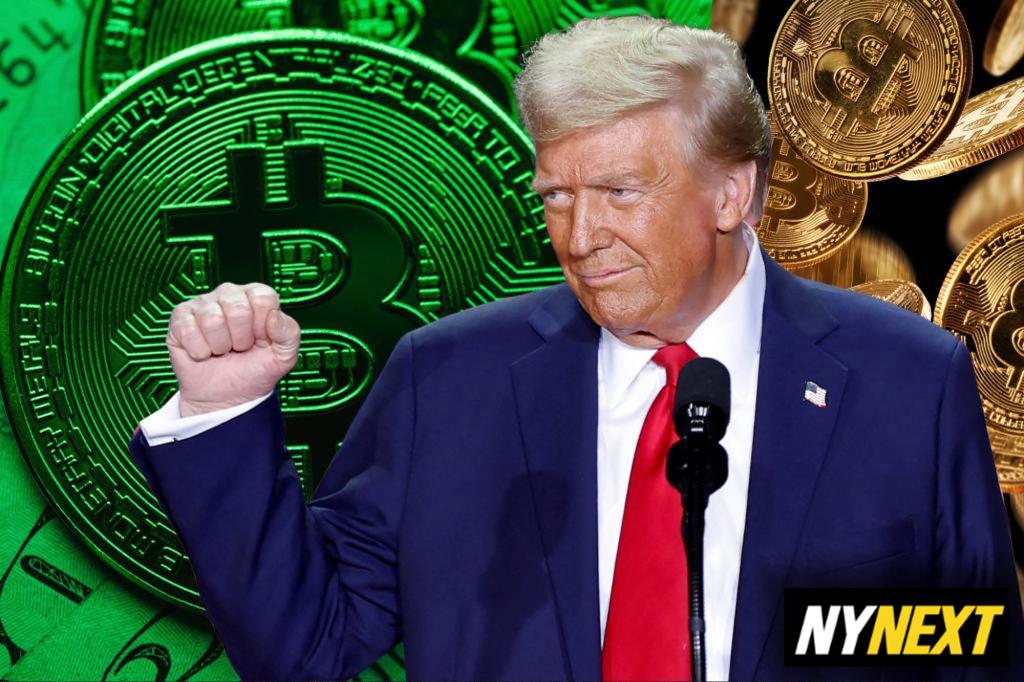After years of regulatory “harassment” under the Biden administration – as one notable investor described it to NYNext – the cryptocurrency community is celebrating Donald Trump’s inauguration as the end of a four-year “terror” and announcing a significant political reversal aimed at legitimizing the industry.
This shift is marked by the appointment of pro-crypto officials like David Sacks as AI and crypto czar and the appointment of Paul Atkins as SEC chairman, as well as the promise of executive orders as soon as on the first day which will create a Bitcoin reserve and end debanking.
“The entire market is relieved…we are seeing a seismic shift in the approach and tone of government and regulatory agencies,” said Frank Chaparro, an early Bitcoin investor and director of special projects on crypto news site The Block. “What this means in practice is that banks will be able to touch crypto – for the last four years they’ve been told they can’t.”
According to sources, simply ending debanking – or refusing to work with customers because of their crypto connection – could be enough to help the sector thrive.
“Every bank that worked with cryptocurrencies faced regulatory harassment,” Nic Carter, a crypto investor at Castle Island Ventures who sounded the alarm on bank takedown efforts, told NYNext. Biden.
Carter called Biden’s so-called debanking efforts “Operation Chokepoint 2.0” — a reference to the Obama administration’s Operation Chokepoint, which aimed to crack down on illicit activities, like drug sales, but which ended up going after legal businesses like gun traffickers.
Under the Biden administration, regulators at the Federal Deposit Insurance Corporation (FDIC) have asked banks not to work with cryptocurrency companies, which has hampered the sector. Venture capitalist Marc Andreessen called the administration’s action “terrorizing” startups — and said in an interview with Joe Rogan last month that banks had been pushed to defund 30 startups he was involved in. had invested.
“This is a privatized sanctions regime,” Andreesen said.
“Banks never tell you why they are taking away your bank accounts,” Carter adds. “They can communicate verbally that there are reputational risks, but the conversation is so murky.”
This situation has led to crypto startups moving overseas or never launching in the first place.
With this change alone, Carter predicts a renaissance of crypto startups: “All the startups that left are coming back (to the United States)… that was the first thing cryptocurrencies wanted to change. »
And there are already some early signs of this happening, sources add.
Dennis Dinkelmeyer, founder and CEO of European cryptocurrency investment firm Midas, told NYNext that he plans to launch in the United States this year.
“Market founders are looking to make a comeback or expand into the U.S. for the first time in four years,” Dinkelmeyer said. “Enthusiasm is returning and you see it in recent news of big projects like TON (Midas’ crypto bank on the blockchain) entering the US market for the first time.”
During his administration, Biden has appointed officials who have attempted to crack down on the industry – passing laws that make it difficult for traditional institutions to hold cryptocurrency. Lawmakers and regulators viewed the industry, which remains highly speculative, as something to be moderated rather than carefully expanded, sources say.
While they recognize there are risks, these people want to see rules that at least allow crypto companies to operate and grow in the United States.
On Friday, Sacks will host the first-ever Crypto Ball in Washington, DC, kicking off a weekend of celebrations ahead of Trump’s inauguration on January 20. The black-tie event, with tickets ranging from $2,500 (and already sold out) to $1. million – which includes a private dinner with the president-elect – includes sponsors such as Coinbase, Solana, MicroStrategy, Kraken, Galaxy Digital and more.
Anthony Pompliano, founder and CEO of Professional Capital Management, explains that in the coming months, he is optimistic that the Trump administration will get into the nitty-gritty of regulations and change accounting rules to make Bitcoin transactions easier.
While many in the cryptocurrency community applaud the pro-crypto executive orders Trump is expected to issue, one idea is sparking more controversy: the idea of a U.S.-first strategic reserve that would prioritize state-founded digital coins -United, like Solana. , USD Coin and XRP from Ripple.
In recent weeks, Trump has met with the founders of these coins and, according to sources, he is receptive to the idea.
The insiders, who spoke on condition of anonymity, shared concerns that this could delegitimize efforts to promote Bitcoin, which is the asset they want to prioritize.
But sources also told the Post that these cracks are taking a back seat to what they believe will become a golden age of crypto.
Chaparro, for his part, believes Trump has already set a new tone for the industry: “It’s a sea change – America is back in business for crypto founders. »

This story is part of NYNext, a new editorial series that highlights New York innovation across industries, as well as the people leading the way.




